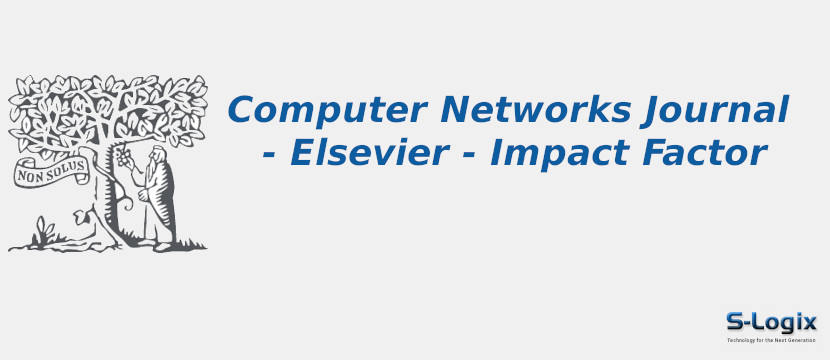Computer Networks is a peer-reviewed journal published by Elsevier. It focuses on research in the field of computer networks, providing a platform for researchers, academics, and practitioners to publish original research articles, reviews, and case studies that advance the understanding and application of computer networking technologies and protocols.
Objective:
The primary objective of Computer Networks is to promote research and innovation in computer networking. The journal aims to explore methodologies, protocols, algorithms, and applications that enhance the design, performance, and security of computer networks. By publishing high-quality research, the journal contributes to the advancement of networking solutions and their impact on communication systems, distributed computing, and internet technologies.
Interdisciplinary Focus:
Computer Networks adopts an interdisciplinary approach, welcoming contributions from various fields related to computer networks, including but not limited to,
Computer Science,
Electrical Engineering,
Information Technology,
Communication Systems,
Wireless Networks,
Internet of Things (IoT),
Cloud Computing,
Cybersecurity,
Network Management,
Data Science.
This interdisciplinary perspective fosters collaboration and innovation, leading to the development of advanced techniques and solutions that address the complex challenges in computer networking.
Global Reach and Impact:
With a broad international readership and authorship, Computer Networks has a global reach and impact. Its publications contribute to the dissemination of knowledge and advancements in computer networking worldwide. The journal content influences both academic research and practical applications, driving progress in areas such as network architecture, protocol design, network optimization, and network security.
High Standards and Rigorous Review:
Maintaining high academic standards, Computer Networks conducts a rigorous peer-review process. Each submitted manuscript undergoes thorough evaluation by experts in the field to ensure the quality, originality, and scientific rigor of the research. This stringent review process upholds the integrity and reputation of the journal, ensuring that only high-quality and impactful research is published.
Significance:
Computer Networks plays a significant role in advancing research and practice in computer networking. By providing a platform for the publication of cutting-edge research findings, the journal contributes to the growth of knowledge and innovation in networking principles and practices. It serves as an essential resource for researchers, practitioners, and policymakers seeking to leverage networking technologies to improve communication systems, enhance internet infrastructure, and address emerging challenges in a connected world.
Journal Home: Journal Homepage
Editor-in-Chief: Tommaso Melodia
scope:
The Computer Networks journal, published by Elsevier, is a renowned peer-reviewed publication focusing on the broad spectrum of networking technologies and their applications. It provides a platform for researchers, engineers, and practitioners to disseminate their latest findings, advancements, and innovations in the field of computer networks. Here is an overview of its key focus areas and scope:
1. Network Architectures and Protocols:
Research on the design, analysis, and optimization of network architectures, including wired, wireless, and hybrid networks.
Studies on network protocols, algorithms, and architectures, such as TCP/IP, Ethernet, routing protocols, and quality of service (QoS) mechanisms.
2. Network Security and Privacy:
Advancements in network security technologies, including cryptography, authentication, access control, and intrusion detection/prevention systems.
Research on privacy-enhancing techniques, secure communication protocols, and security management in distributed networks.
3. Wireless and Mobile Networks:
Exploration of wireless communication technologies, including cellular networks, ad hoc networks, sensor networks, and Internet of Things (IoT) devices.
Studies on mobile network protocols, mobility management, handover strategies, and energy-efficient communication protocols.
4. Internet Technologies and Applications:
Research on Internet architectures, protocols, and services, including Web technologies, content delivery networks (CDNs), and cloud computing.
Studies on Internet-scale applications, such as social networks, multimedia streaming, online gaming, and peer-to-peer (P2P) systems.
5. Network Performance Evaluation and Optimization:
Advancements in network performance modeling, measurement, and evaluation techniques, including simulation, analytical modeling, and experimental studies.
Research on network optimization algorithms, congestion control mechanisms, traffic engineering, and resource allocation strategies.
6. Software-Defined Networking (SDN) and Network Function Virtualization (NFV):
Exploration of SDN architectures, protocols, and applications, including network programmability, network slicing, and software-defined WANs.
Research on NFV technologies, virtual network functions (VNFs), service chaining, and orchestration frameworks.
7. Edge and Fog Computing:
Advancements in edge and fog computing paradigms, including architectures, middleware, and applications for decentralized data processing and storage.
Research on edge intelligence, edge caching, and offloading strategies to improve network performance and reduce latency.
8. Blockchain and Distributed Ledger Technologies:
Exploration of blockchain architectures, consensus mechanisms, and smart contract applications in decentralized networks.
Research on distributed ledger technologies, decentralized identity management, and blockchain-based trust and security solutions.
9. Network Management and Operations:
Advancements in network management techniques, including network monitoring, fault detection, configuration management, and performance optimization.
Research on autonomic networking, self-healing networks, network orchestration, and intent-based networking.
10. Emerging Technologies and Future Trends:
Exploration of emerging networking technologies, such as 5G and beyond, Internet of Things (IoT), machine learning for networking, and quantum networking.
Research on the future evolution of computer networks, including novel architectures, protocols, and applications.
Print ISSN: 1389-1286
Electronic ISSN: 1872-7069
Abstracting and Indexing: Science Citation Index Expanded, Scopus.
Imapct Factor 2023: 5.6
Subject Area and Category: Computer Sciences, Electronics and Telecommunications
Publication Frequency: Semimonthly
H Index: 155
Q1: Computer Networks and Communications
Q2:
Q3:
Q4:
Cite Score: 10.7
SNIP: 1.711
Journal Rank(SJR): 1.625
Latest Articles: Latest Articles in Computer Networks
Guidelines for Authors: Computer Networks Author Guidelines
Paper Submissions: Paper Submissions in Computer Networks
Publisher: Elsevier Science B.V
Country: Netherlands
